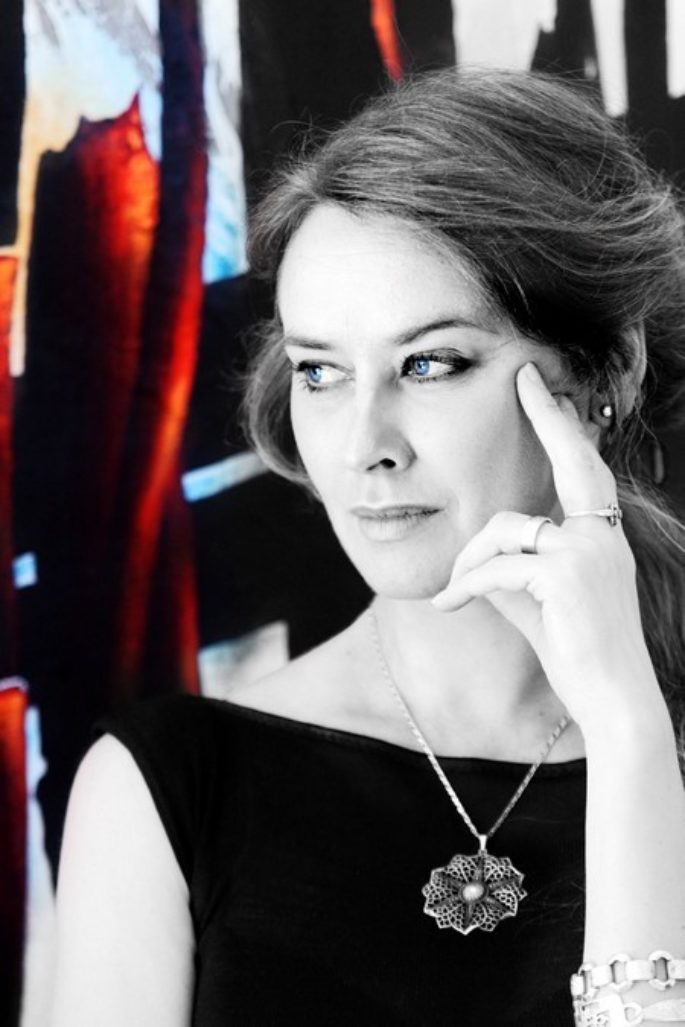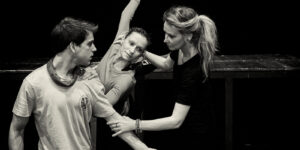DJKT 03/2006 - Eva Ichová
The garden is an invitation to a world of boyish games, adventures, miracles and wishes come true. How is this world close to your heart?
I still play with the boys, I neither seek adventure nor avoid it - I am a believer in the motto "I'd rather kill myself once than wake up all my life", miracles are the order of the day and I am afraid of wish fulfillment for known reasons. Seriously. I've lived in the Garden since I was four years old, when my brother was born and I was moved into a bunk bed. I was alone in those high rises, and the shelf could only hold a few necessities. Among them a book with big-headed boys, a cat on a tricycle, and elephants that I inherited from my dad. I didn't know how to read yet, I made up stories. Other books I moved upstairs were: Andersen, Hrubin and Werich's Fimfárum. My father - an artist himself - delighted by my fascination with illustrations, wanted to explain to me that it was drawn by a gentleman called Trnka and ... I really resented him. The pictures were so vivid, they really existed. But the idea that some moustachioed gentleman had to take pencil and paints to them was so remote and crude. That was my greatest unconscious compliment to Trnka.
It is evident from Messrs. Wednesday and Kalfus that they are throwing themselves into the game with gusto and dash. Can you also lean on the necessary level of playfulness in the ensemble?
I'm sure I can. I know the dancers, they're my colleagues. Although - some have more playfulness and less concentration and some have the opposite. I wish we would start with playfulness, then concentrate on mastering all the technical stuff, go around the circle, come back to playfulness and dive into the audience with gusto, dive into the audience. You know what sometimes comes to mind for actors or dancers who don't just perform for children when the term children's performance comes up? - "left back and I'm playing at Christmas". That makes me anxious. I'm not abdicating responsibility, it's a lot even for me. But I would like to note here that I agree with the thesis - theatre is not for children and adults, but good and bad. We could find many magical and mysterious gardens in literature, and I can think of one in the movies, in Kachyna's Love Between the Raindrops. For a young couple in love, it was a dreamy refuge from the bitterness of life.
Do you also have a secret corner of your heart somewhere where you can escape from the mundane everyday?
I can't say, it's in Prague, and someone might find me there when I want to be alone. Besides, the cemetery in Malvasinki is not so unknown. However, in my childhood, my Garden did exist. I didn't run away from the everyday, but I went there to be afraid. My great-grandmother was its owner, actually a nice person, but - God forgive me and give her an easy land - the whole family was afraid of her. She was stern, hunchbacked, with a cane that she constantly threatened, and she had a beard. You weren't allowed to touch her garden, so it grew and grew. Not with dog wine, but with rose hips, ferns, ivy and all sorts of things. There was a creek that I always fell into because it was covered by burdock as big as me, and there were toads lurking. A hedgehog lived under a rusty bathtub full of leeches, and instead of a cat, I was frightened by my grandmother's rabid rooster, ready to jump on my head at any moment. After the floods, my grandmother, axe in hand and bloodied hands, triumphantly announced that several carp had landed on her currant tree, and that they had been executed and were waiting in the freezer for Christmas. How a child feels in such a Garden, I really know.
Trnka's little heroes have access to the magical garden as long as they can treasure seemingly worthless and insignificant things. What can be used to gain access to yours?
By things seemingly worthless and insignificant, but also by efforts and overcoming obstacles. A priori, I have a distrust of things that are easy and readily available. Which is sometimes stupid - there may be an even stupider kingdom beyond the deva-tero mountains than there is here, but I want to see it.
The garden has long been taken over by puppet theatre, the poetics of which are close to the author. What will replace Trnka's gentle humour and the poetic playfulness of his text with theatre whose means of expression is movement?
I hope, God willing, that nothing will be replaced. Both will simply be translated into a different "language" or described in different "words". Of course, I have to give up, for example (assuming we don't use film projection, which we won't), an element that I love in other kinds of art such as fine art, film, literature, etc., and that is detail. It doesn't have to be a handicap. The composer and I agreed on the use of certain minimalist elements, which can also act as focus, focus, detail.
I suppose that the whale - if there is one - will only be resting, dancing cats thanks to Cats will not surprise anyone anymore, but how did you manage with the movement vocabulary of elephants?
I'm not a ballet dancer at all costs. There will be too many dancing characters. I'll leave it to Mr. Artist to make them beautiful, and Mr. Librettist to tell them why. We'll let them be visual. At least for now, I'm not counting on any elephant pas-de-deux.




Comments are closed.